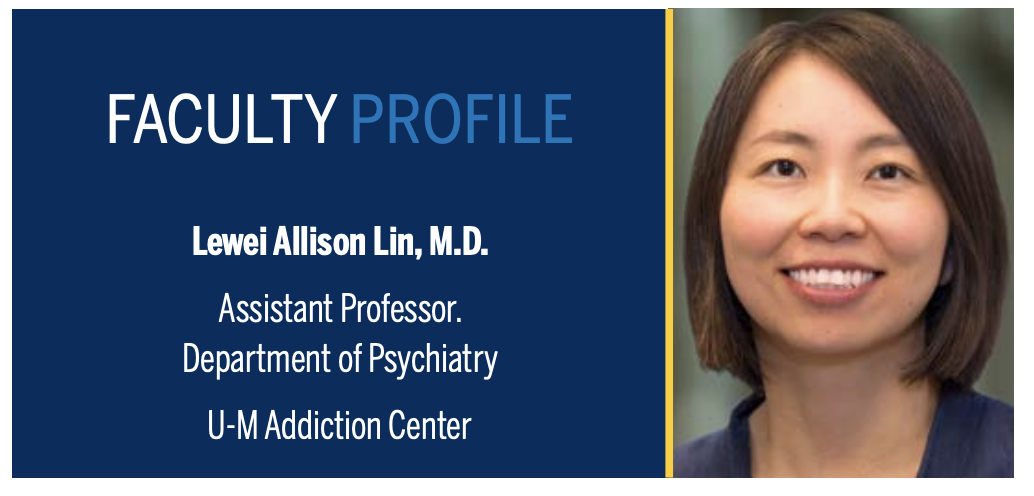
Allison Lin, M.D., is an addiction psychiatrist in the U-M Addiction Center. Dr. Lin wears two hats: she is an addiction clinician — taking care of patients at the Ann Arbor VA with substance use disorders — and a researcher, focused on ways to improve access to and quality of addiction treatment. She is an assistant professor at the Department of Psychiatry as well as a research investigator at the VA Center for Clinical Management Research. Prior to joining the Addiction Center team, Dr. Lin graduated from MIT with a B.S. in Economics and Chemical Engineering, an M.D. from Yale University School of Medicine, completed her residency at the U-M Department of Psychiatry, and completed her Addiction Psychiatry and Clinical Research Fellowship at the U-M Addiction Center.
"My interest in addiction research directly stems from my clinical experience seeing the vast impacts of addiction on the lives of patients and their families and often the misunderstandings about the illness,"
says Dr. Lin. “However, I am so hopeful to see such tremendous growth across the U.S. in interest to understand and treat addiction as we have recognized the negative impacts of overdose and other sequelae and also the positive impacts that treatment can bring.”
Dr. Lin’s research examines disparities in treatment access and quality of care and outcomes for patients with substance use disorders. Her goal is to bring to light the barriers that prevent individuals from obtaining high-quality care by utilizing large healthcare datasets to highlight treatment disparities and designing and testing new interventions to improve treatment access. She studies clinician and provider behaviors and treatment approaches to identify practices associated with high-quality addiction care. She also focuses on telehealth interventions, as part of new interventions that are both more accessible and address other important needs for overall patient health. Dr. Lin has made major contributions to the addiction research field and continues to inform systems and policymakers of the barriers and potential solutions.
Dr. Lin's work includes:
- Research developing telemedicine models of care for veterans and other patients with opioid and other substance use disorders. She is a national leader informing telemedicine care for patients with substance use disorders, as highlighted by her recent article in JAMA Psychiatry.
- She co-leads the Michigan Opioid Collaborative and the MI-teleCONNECT study that provides support for Michigan primary care and mental health providers to deliver better addiction care, and directly supports patients by providing a phone-based counseling intervention to support recovery.
- She co-leads the Persist study, a large NIH-funded randomized trial testing a phone-based psychotherapy intervention addressing both chronic pain and substance use for patients with opioid use disorder starting medication treatment.




